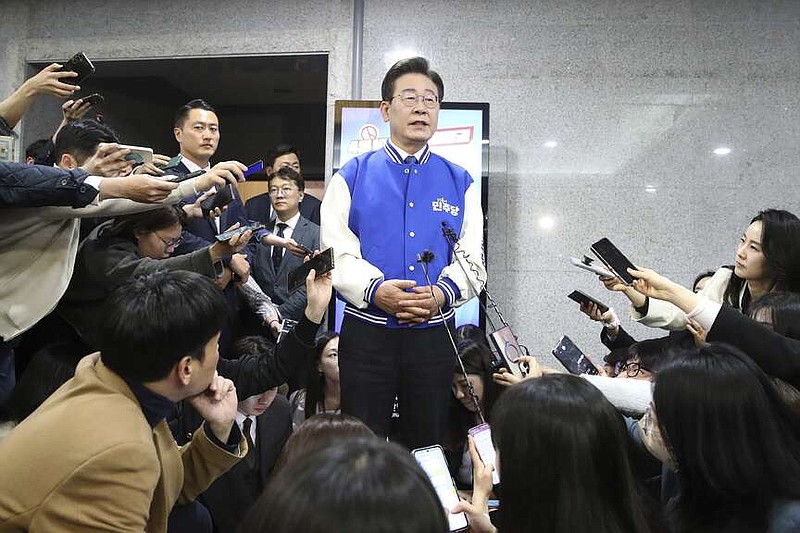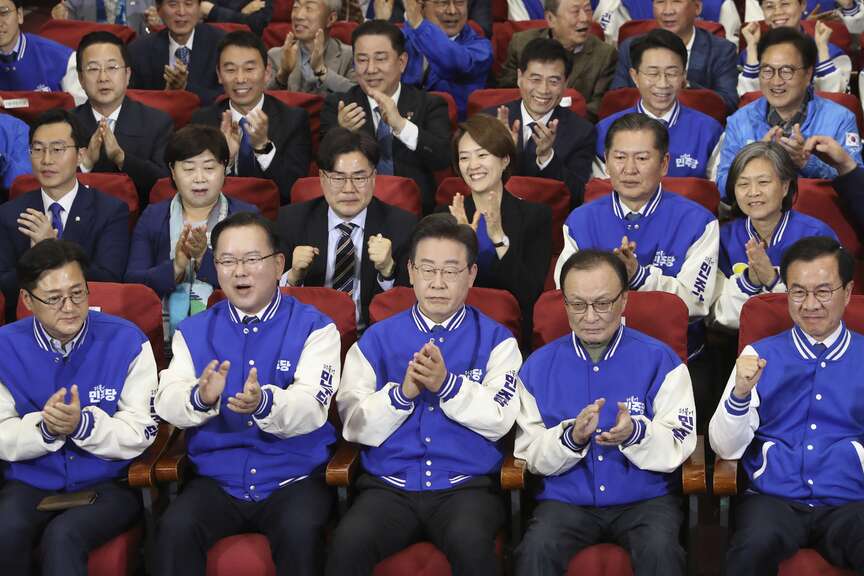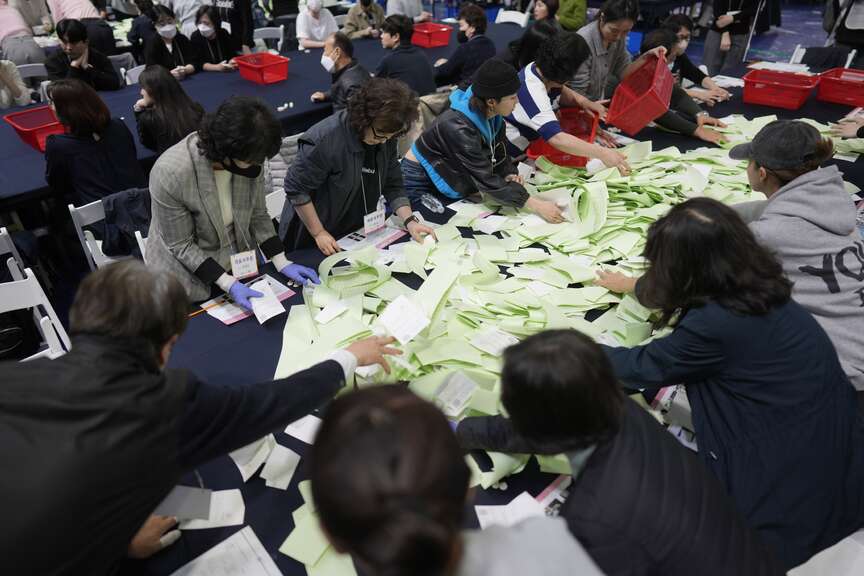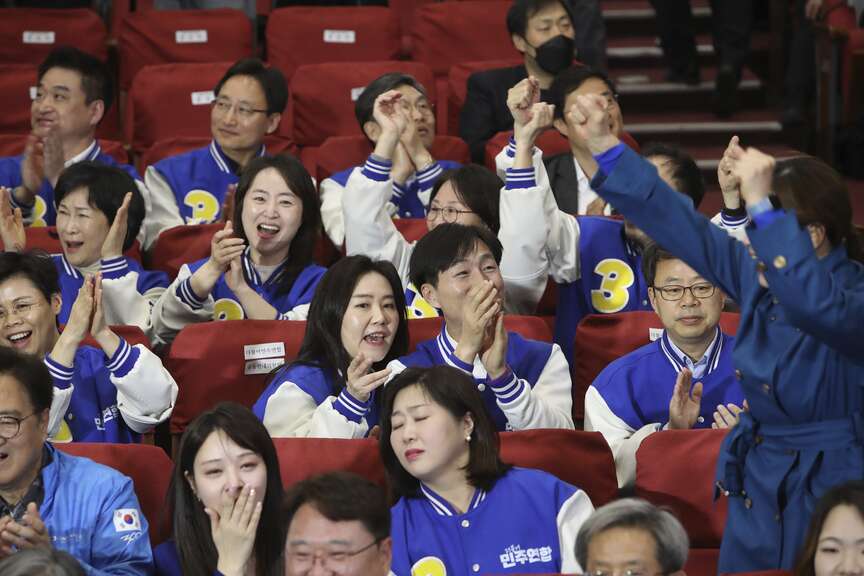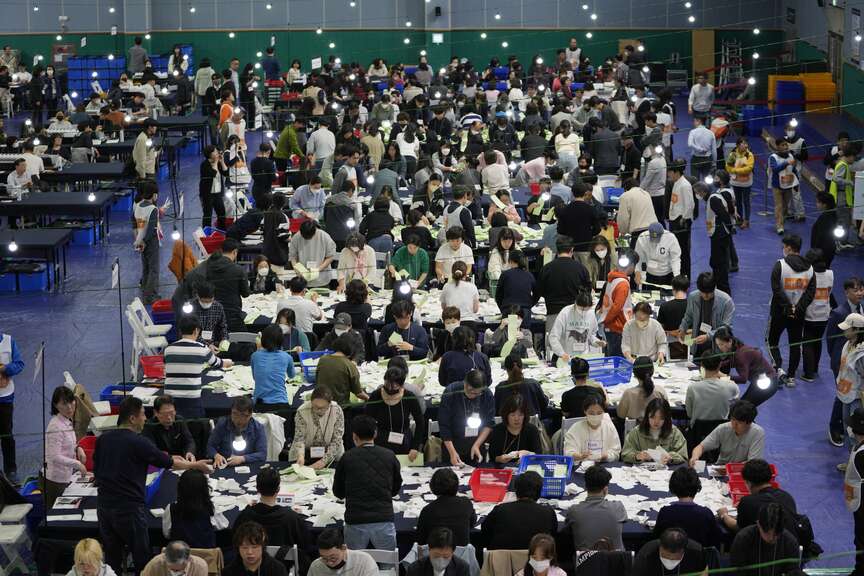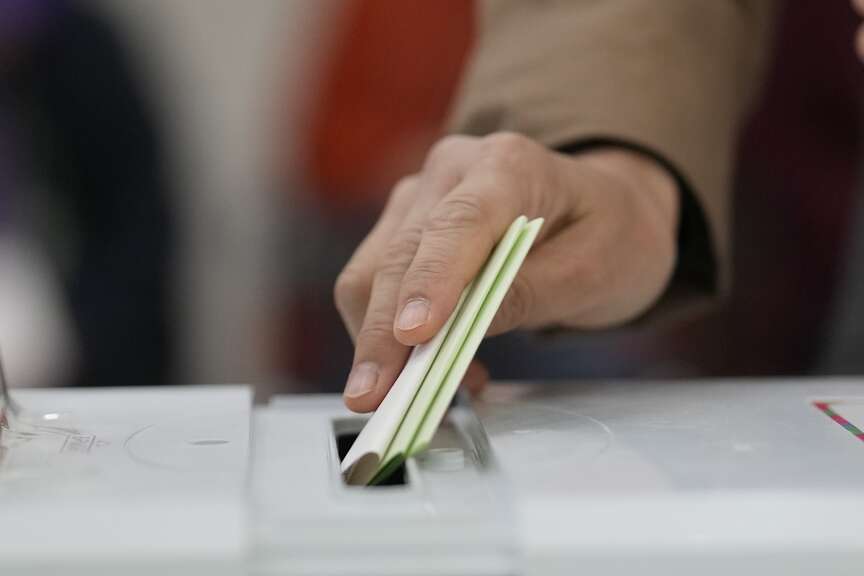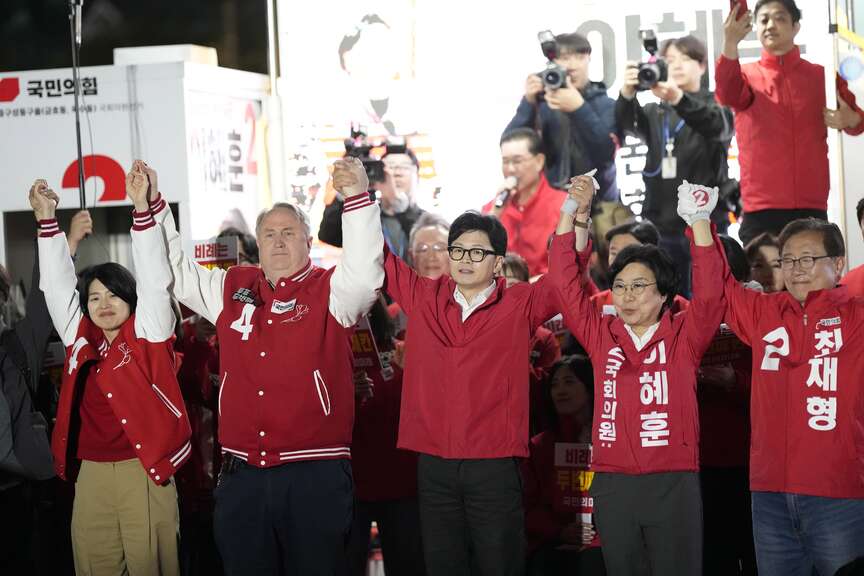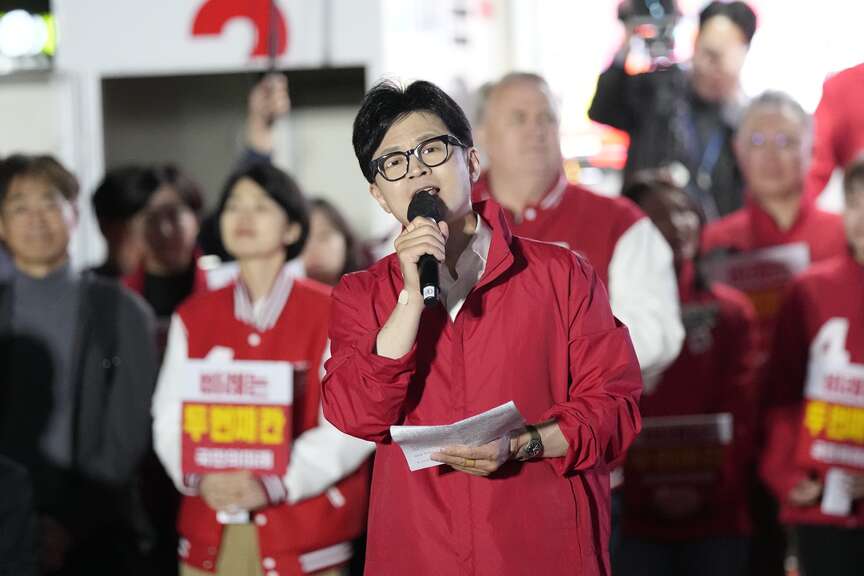SEOUL, South Korea -- South Korea's prime minister and senior presidential officials offered to resign en masse today, after their conservative ruling party suffered a crushing defeat in parliamentary elections.
The results of Wednesday's elections were a huge political blow to President Yoon Suk Yeol, likely setting back his domestic agenda and leave him facing an intensifying political offensive by his liberal opponents during his remaining three years in office.
Prime Minster Han Duck-soo and all senior presidential advisers to Yoon, except those in charge of security issues, submitted their resignations, according to Yoon's office. It didn't immediately say whether Yoon accepted their resignations.
Executive power in South Korea is heavily concentrated in the president, but the prime minister is the No. 2 official and leads the country if the president becomes incapacitated.
Yoon said he will "humbly uphold" the public sentiments reflected in the election outcome and focus on improving people's economic situations and on reforming state affairs, according to his office.
In a separate news conference, ruling People Power Party leader Han Dong-hoon said he would step down as well to take responsibility for the election defeat.
With most of the votes counted, the main opposition Democratic Party and its satellite party appeared to have won a combined 175 seats in the 300-member National Assembly. Another small liberal opposition party was expected to win 12 seats under a proportional representation system, according to South Korean media tallies.
Yoon's ruling People Power Party and its satellite party were projected to have obtained 109 seats.
The final official results were expected later today.
But the outcome means the liberal opposition forces will extend their control of the parliament, though they likely won't have the super majority of 200 seats that would give them the power to overturn vetoes and even impeach the president.
Wednesday's election was widely seen as a midterm confidence vote on Yoon, a former top prosecutor who took office in 2022 for a single five-year term.
He has pushed hard to boost cooperation with the U.S. and Japan as a way to address a mix of tough security and economic challenges. But Yoon has been grappling with low approval ratings at home and a liberal opposition-controlled parliament that has limited his major policy platforms.
If the opposition parties garner a combined 200 seats -- two-thirds of the 300 parliamentary seats at stake -- or more, they will have legislative powers to pass bills vetoed by a president and can even impeach him.
After gathering to watch TV broadcasts showing results of the exit polls, Democratic Party members cheered and clapped their hands. "We'll humbly watch the people's choices to the end. Thanks much!" party leader Lee Jae-myung told reporters.
Of the 300 seats, 254 were to be elected through direct votes in local districts, and the other 46 to the parties according to their proportion of the vote. The final voter turnout for South Korea's 44 million eligible voters was tentatively estimated at 67%, the highest for a parliamentary election since 1992, according to the National Election Commission.
Ahead of the election, the conservatives and their liberal rivals exchanged toxic rhetoric and mudslinging. Their mutual contempt deepened during the 2022 presidential election, during which Yoon and Lee, then the Democratic Party candidate, spent months demonizing each other. Yoon eventually beat Lee in the country's most closely fought presidential contest.
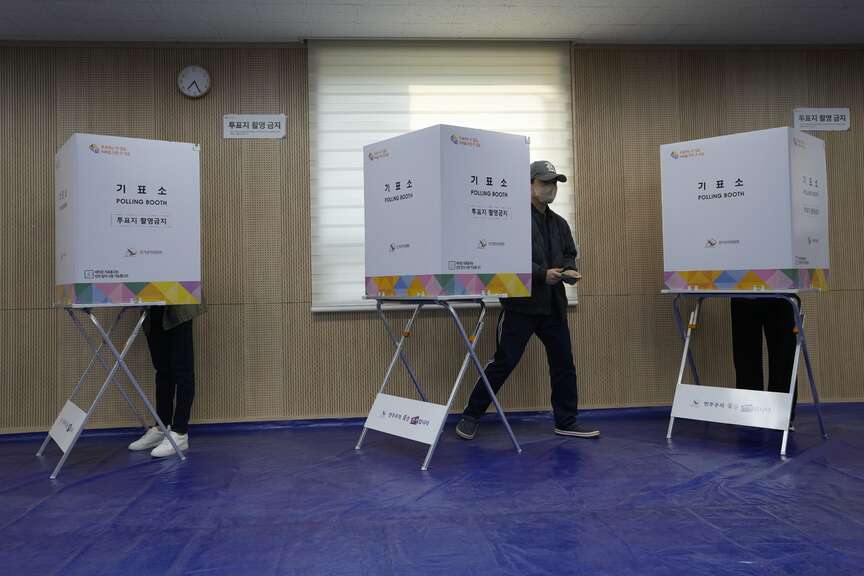 A voter exits out to cast his vote for the parliamentary election at a polling station in Seoul, South Korea, Wednesday, April 10, 2024. South Korean President Yoon Suk Yeol faces a crucial referendum Wednesday in a parliamentary election that could determine whether he becomes a lame duck or enjoys a mandate to pursue key policies for his remaining three years in office. (AP Photo/Ahn Young-joon)
A voter exits out to cast his vote for the parliamentary election at a polling station in Seoul, South Korea, Wednesday, April 10, 2024. South Korean President Yoon Suk Yeol faces a crucial referendum Wednesday in a parliamentary election that could determine whether he becomes a lame duck or enjoys a mandate to pursue key policies for his remaining three years in office. (AP Photo/Ahn Young-joon)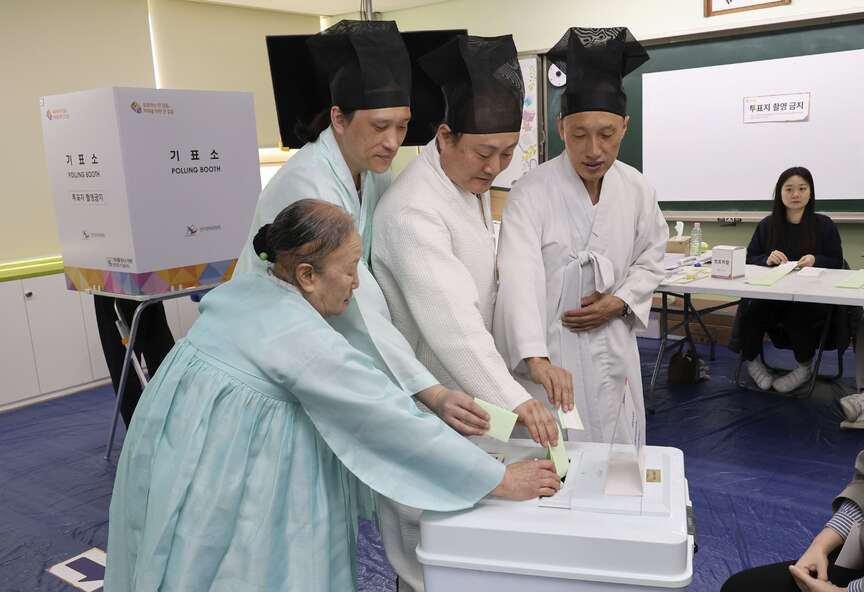 Voters wearing traditional attire pose for a photo as they vote for the parliamentary election at a polling station in Nonsan, South Korea, Wednesday, April 10, 2024. South Korean President Yoon Suk Yeol faces a crucial referendum Wednesday in a parliamentary election that could determine whether he becomes a lame duck or enjoys a mandate to pursue key policies for his remaining three years in office. (Kim June-beom/Yonhap via AP)
Voters wearing traditional attire pose for a photo as they vote for the parliamentary election at a polling station in Nonsan, South Korea, Wednesday, April 10, 2024. South Korean President Yoon Suk Yeol faces a crucial referendum Wednesday in a parliamentary election that could determine whether he becomes a lame duck or enjoys a mandate to pursue key policies for his remaining three years in office. (Kim June-beom/Yonhap via AP)